
openmacro
Multimodal Assistant. Human Interface for computers.
Stars: 62
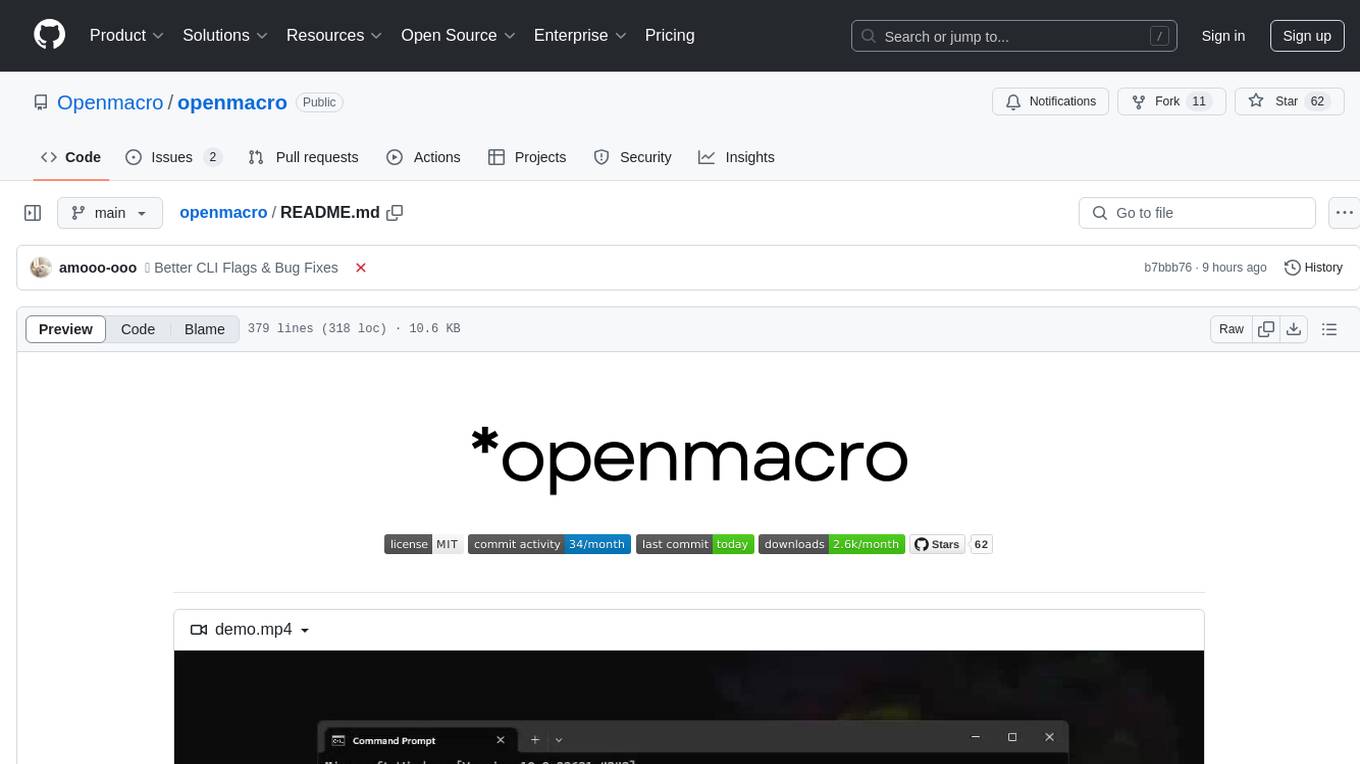
Openmacro is a multimodal personal agent that allows users to run code locally. It acts as a personal agent capable of completing and automating tasks autonomously via self-prompting. The tool provides a CLI natural-language interface for completing and automating tasks, analyzing and plotting data, browsing the web, and manipulating files. Currently, it supports API keys for models powered by SambaNova, with plans to add support for other hosts like OpenAI and Anthropic in future versions.
README:
https://github.com/user-attachments/assets/9360dfeb-a471-49c3-bbdc-72b32cc8eaeb
[!WARNING] DISCLAIMER: Project is in its early stage of development. Current version is not stable.
openmacro is a multimodal personal agent that allows LLMs to run code locally. openmacro aims to act as a personal agent capable of completing and automating simple to complex tasks autonomously via self prompting.
This provides a cli natural-language interface for you to:
- Complete and automate simple to complex tasks.
- Analyse and plot data.
- Browse the web for the latest information.
- Manipulate files including photos, videos, PDFs, etc.
At the moment, openmacro only supports API keys for models powered by SambaNova. Why? Because it’s free, fast, and reliable, which makes it ideal for testing as the project grows! Support for other hosts such as OpenAI and Anthropic is planned to be added in future versions.
This project is heavily inspired by Open Interpreter ❤️
To get started with openmacro, get a free API key by creating an account at https://cloud.sambanova.ai/.
Next, install and start openmacro by running:
pip install openmacro
macro --api_key "YOUR_API_KEY"[!TIP] Not working? Raise an issue here or try this out instead:
py -m pip install openmacro
py -m openmacro --api_key "YOUR_API_KEY"[!NOTE] You only need to pass
--api_keyonce! Next time simply callmacroorpy -m openmacro.
[!TIP] You can also assign different api-keys to different profiles!
py -m openmacro --api_key "YOUR_API_KEY" --profile "path\to\profile"openmacro supports cli args and customised settings! You can view arg options by running:
macro --helpTo add your own personalised settings and save it for the future, run:
macro --profile "path\to\profile"Openmacro supports custom profiles in JSON, TOML, YAML and Python:
Python
Profiles in `python` allow direct customisation and type safety!What your profile.py might look like:
# imports
from openmacro.profile import Profile
from openmacro.extensions import BrowserKwargs, EmailKwargs
# profile setup
profile: Profile = Profile(
user = {
"name": "Amor",
"version": "1.0.0"
},
assistant = {
"name": "Macro",
"personality": "You respond in a professional attitude and respond in a formal, yet casual manner.",
"messages": [],
"breakers": ["the task is done.",
"the conversation is done."]
},
safeguards = {
"timeout": 16,
"auto_run": True,
"auto_install": True
},
extensions = {
# type safe kwargs
"Browser": BrowserKwargs(headless=False, engine="google"),
"Email": EmailKwargs(email="[email protected]", password="password")
},
config = {
"verbose": True,
"conversational": True,
"dev": False
},
languages = {
# specify custom paths to languages or add custom languages for openmacro
"python": ["C:\Windows\py.EXE", "-c"],
"rust": ["cargo", "script", "-e"] # not supported by default, but can be added!
},
tts = {
# powered by KoljaB/RealtimeSTT
# options ["SystemEngine", "GTTSEngine", "OpenAIEngine"]
"enabled": True,
"engine": "OpenAIEngine",
"api_key": "sk-example"
}
)And can be extended if you want to build your own app with openmacro:
...
async def main():
from openmacro.core import Openmacro
macro = Openmacro(profile)
macro.llm.messages = []
async for chunk in macro.chat("Plot an exponential graph for me!", stream=True):
print(chunk, end="")
import asyncio
asyncio.run(main)JSON
What your profile.json might look like:
{
"user": {
"name": "Amor",
"version": "1.0.0"
},
"assistant": {
"name": "Basil",
"personality": "You have a kind, deterministic and professional attitude towards your work and respond in a formal, yet casual manner.",
"messages": [],
"breakers": ["the task is done.", "the conversation is done."]
},
"safeguards": {
"timeout": 16,
"auto_run": true,
"auto_install": true
},
"extensions": {
"Browser": {
"headless": false,
"engine": "google"
},
"Email": {
"email": "[email protected]",
"password": "password"
}
},
"config": {
"verbose": true,
"conversational": true,
"dev": false
},
"languages": {
"python": ["C:\\Windows\\py.EXE", "-c"],
"rust": ["cargo", "script", "-e"]
},
"tts": {
"enabled": true,
"engine": "OpenAIEngine",
"api_key": "sk-example"
}
}TOML
What your profile.toml might look like:
[user]
name = "Amor"
version = "1.0.0"
[assistant]
name = "Basil"
personality = "You have a kind, deterministic and professional attitude towards your work and respond in a formal, yet casual manner."
messages = []
breakers = ["the task is done.", "the conversation is done."]
[safeguards]
timeout = 16
auto_run = true
auto_install = true
[extensions.Browser]
headless = false
engine = "google"
[extensions.Email]
email = "[email protected]"
password = "password"
[config]
verbose = true
conversational = true
dev = false
[languages]
python = ["C:\\Windows\\py.EXE", "-c"]
rust = ["cargo", "script", "-e"]
[tts]
enabled = true
engine = "SystemEngine"YAML
What your profile.yaml might look like:
user:
name: "Amor"
version: "1.0.0"
assistant:
name: "Basil"
personality: "You have a kind, deterministic and professional attitude towards your work and respond in a formal, yet casual manner."
messages: []
breakers:
- "the task is done."
- "the conversation is done."
safeguards:
timeout: 16
auto_run: true
auto_install: true
extensions:
Browser:
headless: false
engine: "google"
Email:
email: "[email protected]"
password: "password"
config:
verbose: true
conversational: true
dev: false
languages:
python: ["C:\\Windows\\py.EXE", "-c"]
rust: ["cargo", "script", "-e"]
tts:
enabled: true
engine: "SystemEngine"You can also switch between profiles by running:
macro --switch "amor"Profiles also support versions for modularity (uses the latest version by default).
macro --switch "amor:1.0.0"[!NOTE] All profiles are isolated. LTM from different profiles and versions are not shared.
You can also quick update a profile. [BETA]
macro --update "amor"Quick updating allows you to easily update and make changes to your profile. Simply make changes to the original profile file, then call above.
To view all available profiles run:
macro --profilesTo view all available versions of a profile run:
macro --versions <profile_name>openmacro supports custom RAG extensions for modularity and better capabilities! By default, the browser and email extensions are installed.
Write extensions using the template:
from typing import TypedDict
class ExtensionKwargs(TypedDict):
...
class Extensionname:
def __init__(self):
...
@staticmethod
def load_instructions() -> str:
return "<instructions>"
You can find examples here.
[!TIP] classname should not be camelcase, but titlecase instead.
[!NOTE] creating a type-safe kwargs typeddict is optional but recommended.
If extesions does not contain a kwarg class, use:
from openmacro.utils import KwargsUpload your code to pypi for public redistribution using twine and poetry.
To add it to openmacro.extensions for profiles for the AI to use, run:
omi install <module_name>or
pip install <module_name>
omi add <module_name> You can test your extensions by installing it locally:
omi install .- [x] AI Interpreter
- [X] Web Search Capability
- [X] Async Chunk Streaming
- [X] API Keys Support
- [X] Profiles Support
- [X] Extensions API
- [ ]
WIPTTS & STT - [ ]
WIPCost Efficient Long Term Memory & Context Manager - [ ] Semantic File Search
- [ ] Optional Telemetry
- [ ] Desktop, Android & IOS App Interface
- Optimisations
- Cost efficient long term memory and conversational context managers through vector databases. Most likely powered by
ChromaDB. - Hooks API and Live Code Output Streaming
This is my first major open-source project, so things might go wrong, and there is always room for improvement. You can contribute by raising issues, helping with documentation, adding comments, suggesting features or ideas, etc. Your help is greatly appreciated!
You can support this project by writing custom extensions for openmacro! openmacro aims to be community-powered, as its limitations are based on its capabilities. More extensions mean better chances of completing complex tasks. I will create an official verified list of openmacro extensions sometime in the future!
You can contact me at [email protected].
For Tasks:
Click tags to check more tools for each tasksFor Jobs:
Alternative AI tools for openmacro
Similar Open Source Tools

openmacro
Openmacro is a multimodal personal agent that allows users to run code locally. It acts as a personal agent capable of completing and automating tasks autonomously via self-prompting. The tool provides a CLI natural-language interface for completing and automating tasks, analyzing and plotting data, browsing the web, and manipulating files. Currently, it supports API keys for models powered by SambaNova, with plans to add support for other hosts like OpenAI and Anthropic in future versions.
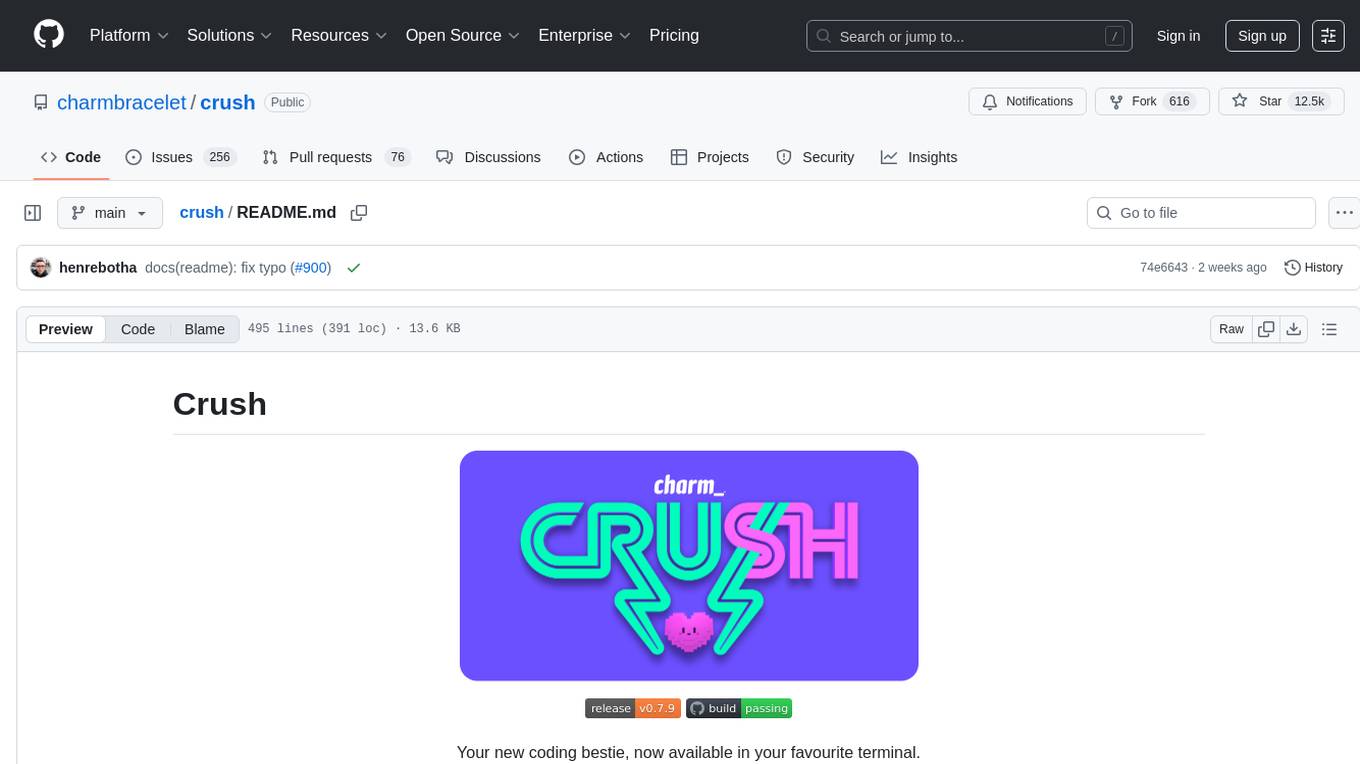
crush
Crush is a versatile tool designed to enhance coding workflows in your terminal. It offers support for multiple LLMs, allows for flexible switching between models, and enables session-based work management. Crush is extensible through MCPs and works across various operating systems. It can be installed using package managers like Homebrew and NPM, or downloaded directly. Crush supports various APIs like Anthropic, OpenAI, Groq, and Google Gemini, and allows for customization through environment variables. The tool can be configured locally or globally, and supports LSPs for additional context. Crush also provides options for ignoring files, allowing tools, and configuring local models. It respects `.gitignore` files and offers logging capabilities for troubleshooting and debugging.

firecrawl
Firecrawl is an API service that takes a URL, crawls it, and converts it into clean markdown. It crawls all accessible subpages and provides clean markdown for each, without requiring a sitemap. The API is easy to use and can be self-hosted. It also integrates with Langchain and Llama Index. The Python SDK makes it easy to crawl and scrape websites in Python code.
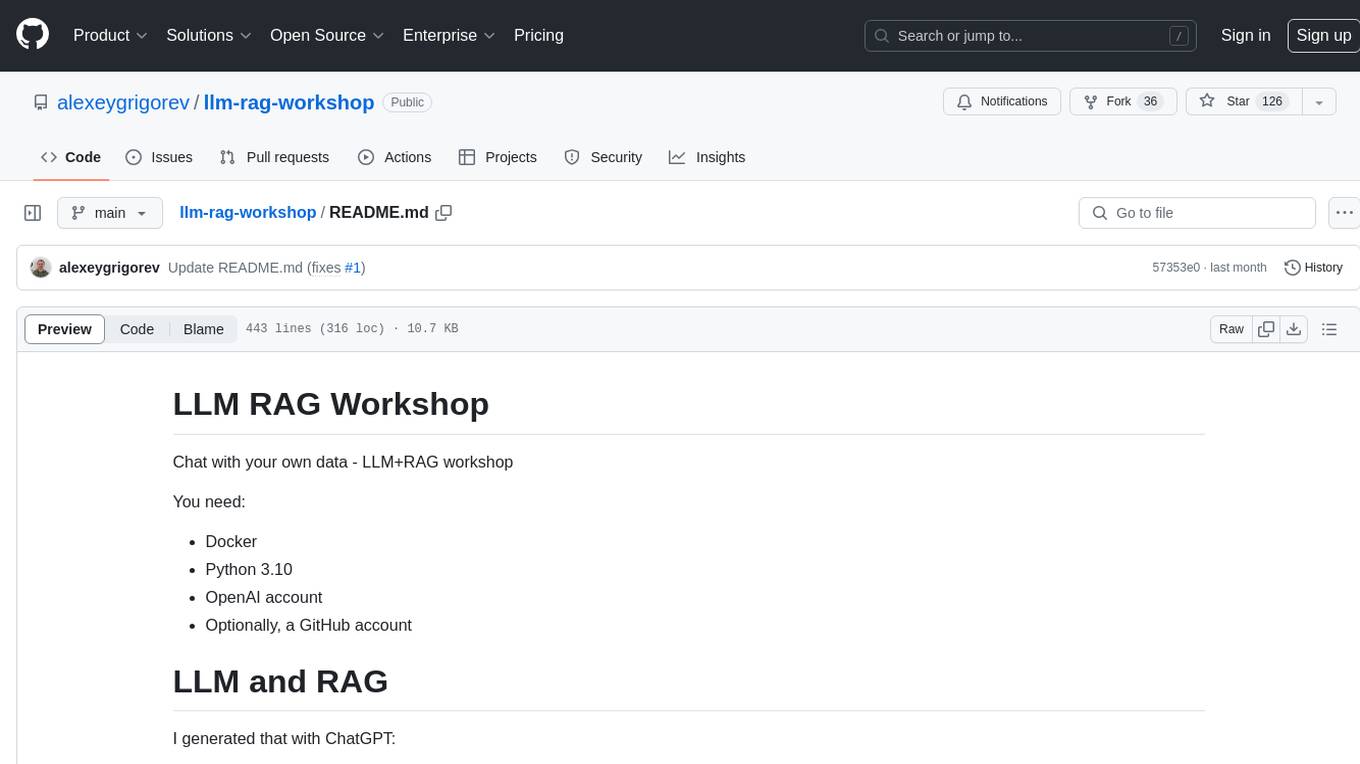
llm-rag-workshop
The LLM RAG Workshop repository provides a workshop on using Large Language Models (LLMs) and Retrieval-Augmented Generation (RAG) to generate and understand text in a human-like manner. It includes instructions on setting up the environment, indexing Zoomcamp FAQ documents, creating a Q&A system, and using OpenAI for generation based on retrieved information. The repository focuses on enhancing language model responses with retrieved information from external sources, such as document databases or search engines, to improve factual accuracy and relevance of generated text.
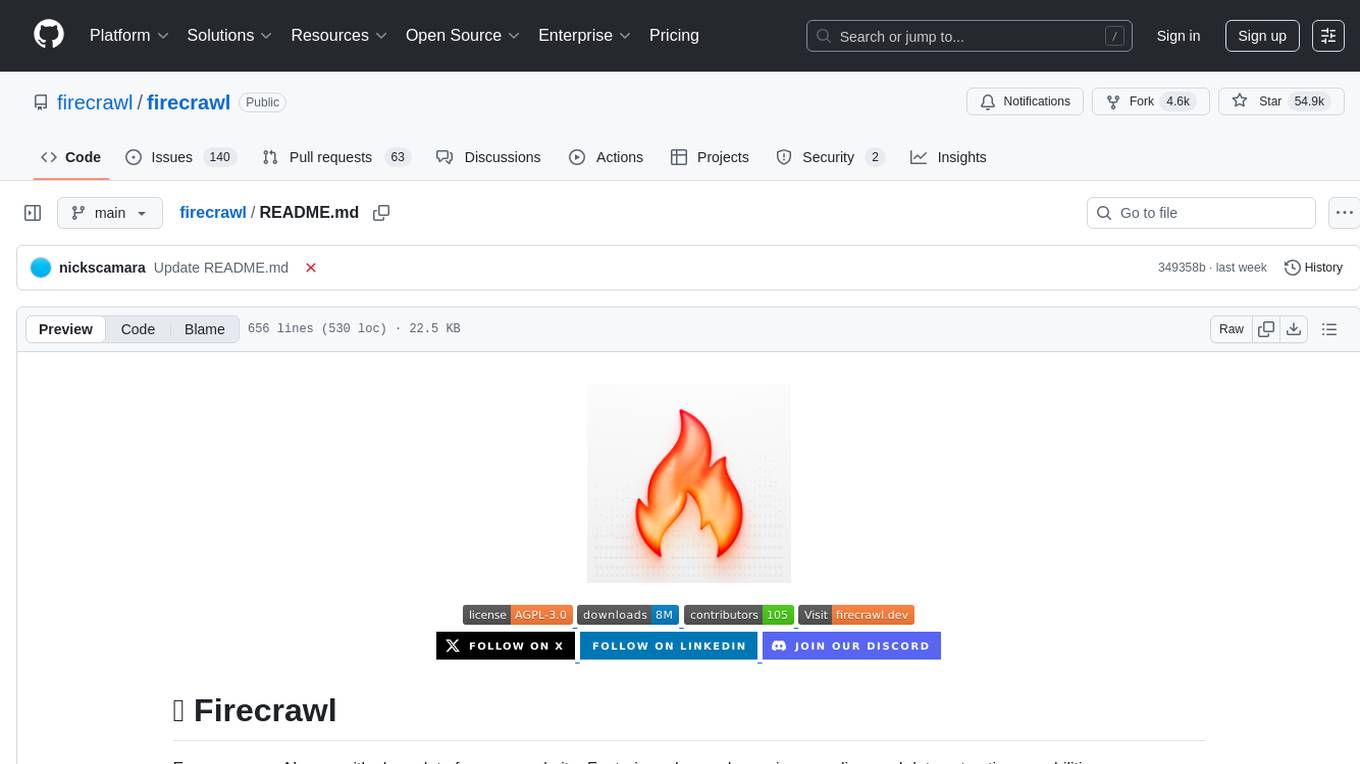
firecrawl
Firecrawl is an API service that empowers AI applications with clean data from any website. It features advanced scraping, crawling, and data extraction capabilities. The repository is still in development, integrating custom modules into the mono repo. Users can run it locally but it's not fully ready for self-hosted deployment yet. Firecrawl offers powerful capabilities like scraping, crawling, mapping, searching, and extracting structured data from single pages, multiple pages, or entire websites with AI. It supports various formats, actions, and batch scraping. The tool is designed to handle proxies, anti-bot mechanisms, dynamic content, media parsing, change tracking, and more. Firecrawl is available as an open-source project under the AGPL-3.0 license, with additional features offered in the cloud version.
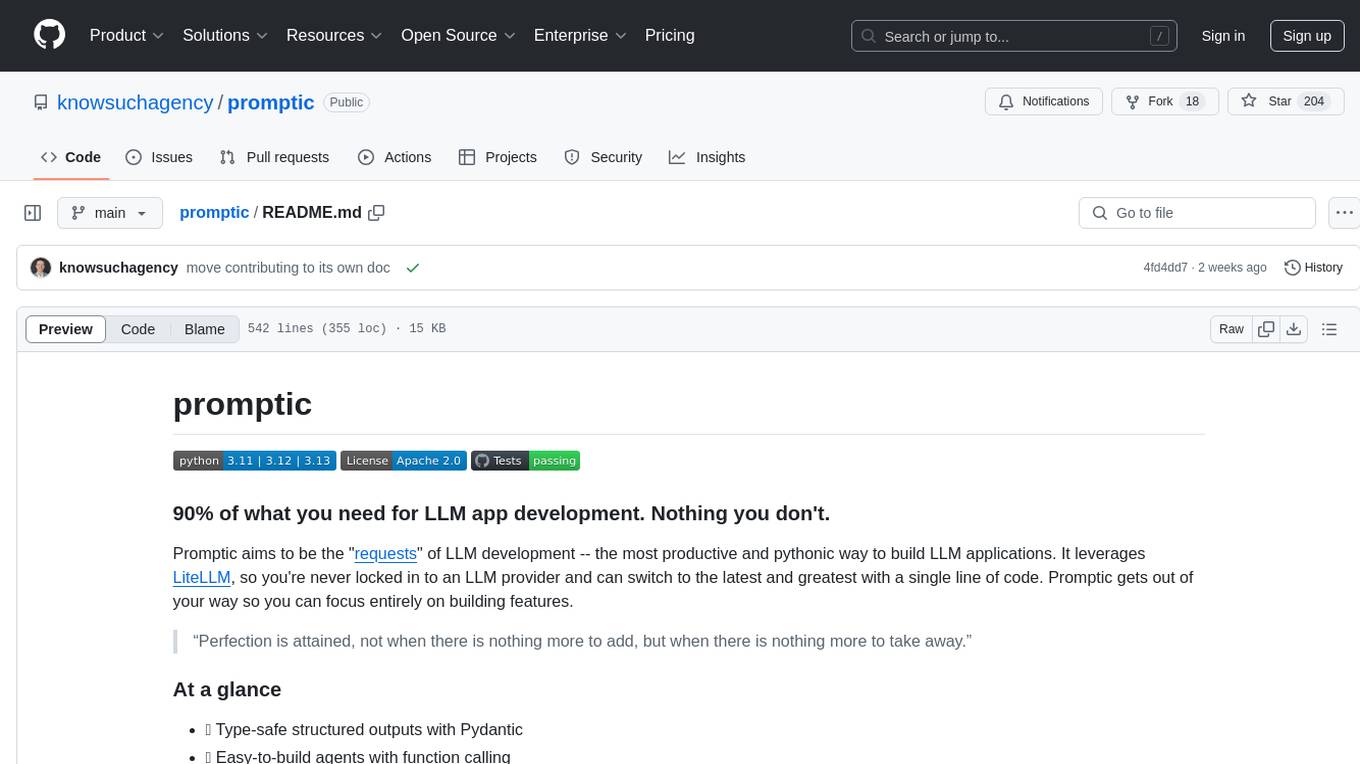
promptic
Promptic is a tool designed for LLM app development, providing a productive and pythonic way to build LLM applications. It leverages LiteLLM, allowing flexibility to switch LLM providers easily. Promptic focuses on building features by providing type-safe structured outputs, easy-to-build agents, streaming support, automatic prompt caching, and built-in conversation memory.
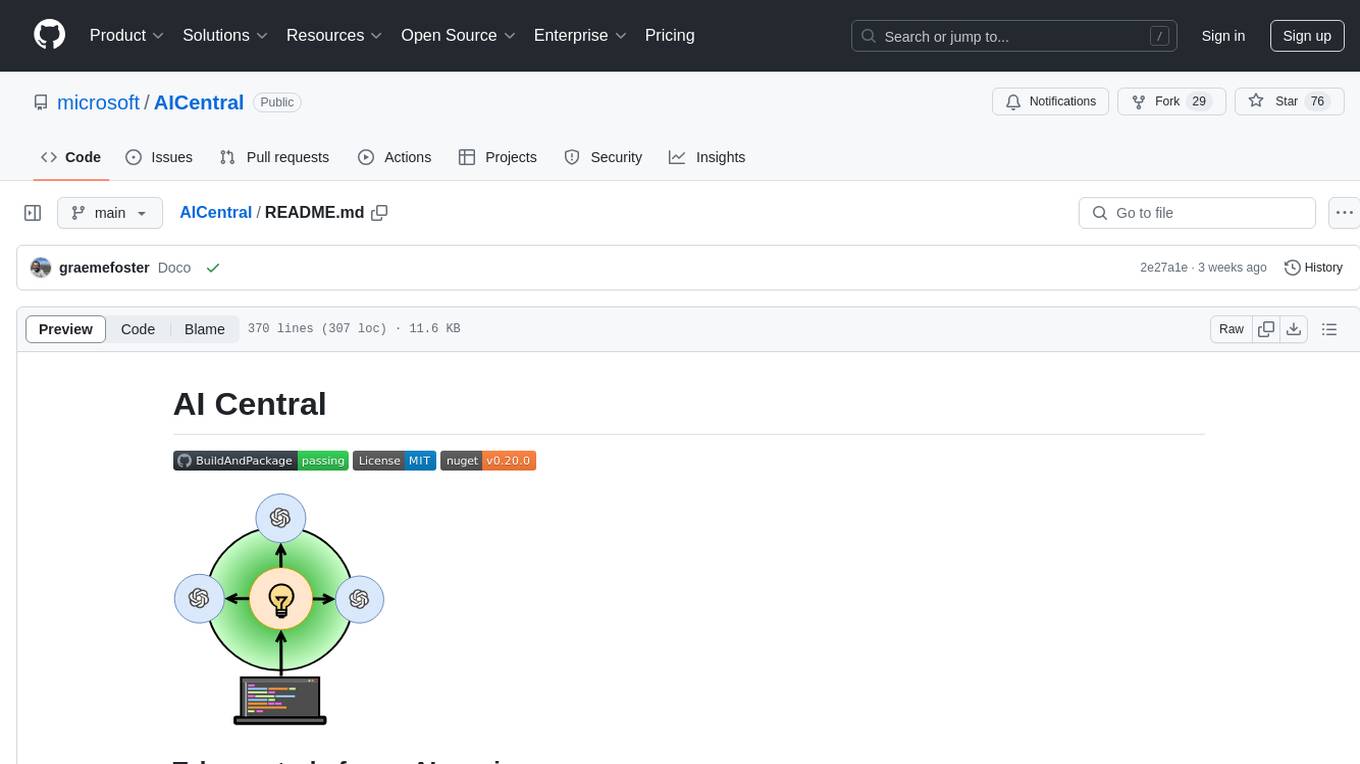
AICentral
AI Central is a powerful tool designed to take control of your AI services with minimal overhead. It is built on Asp.Net Core and dotnet 8, offering fast web-server performance. The tool enables advanced Azure APIm scenarios, PII stripping logging to Cosmos DB, token metrics through Open Telemetry, and intelligent routing features. AI Central supports various endpoint selection strategies, proxying asynchronous requests, custom OAuth2 authorization, circuit breakers, rate limiting, and extensibility through plugins. It provides an extensibility model for easy plugin development and offers enriched telemetry and logging capabilities for monitoring and insights.
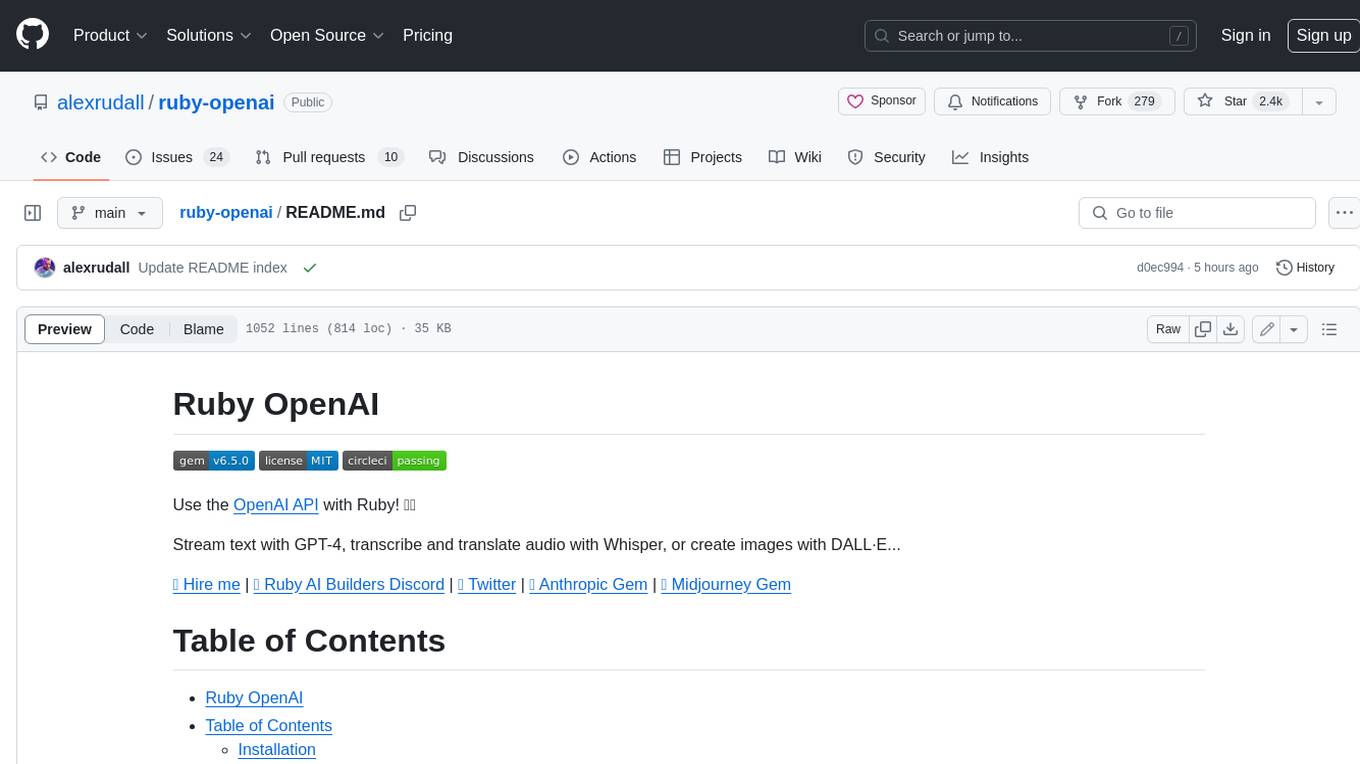
ruby-openai
Use the OpenAI API with Ruby! 🤖🩵 Stream text with GPT-4, transcribe and translate audio with Whisper, or create images with DALL·E... Hire me | 🎮 Ruby AI Builders Discord | 🐦 Twitter | 🧠 Anthropic Gem | 🚂 Midjourney Gem ## Table of Contents * Ruby OpenAI * Table of Contents * Installation * Bundler * Gem install * Usage * Quickstart * With Config * Custom timeout or base URI * Extra Headers per Client * Logging * Errors * Faraday middleware * Azure * Ollama * Counting Tokens * Models * Examples * Chat * Streaming Chat * Vision * JSON Mode * Functions * Edits * Embeddings * Batches * Files * Finetunes * Assistants * Threads and Messages * Runs * Runs involving function tools * Image Generation * DALL·E 2 * DALL·E 3 * Image Edit * Image Variations * Moderations * Whisper * Translate * Transcribe * Speech * Errors * Development * Release * Contributing * License * Code of Conduct
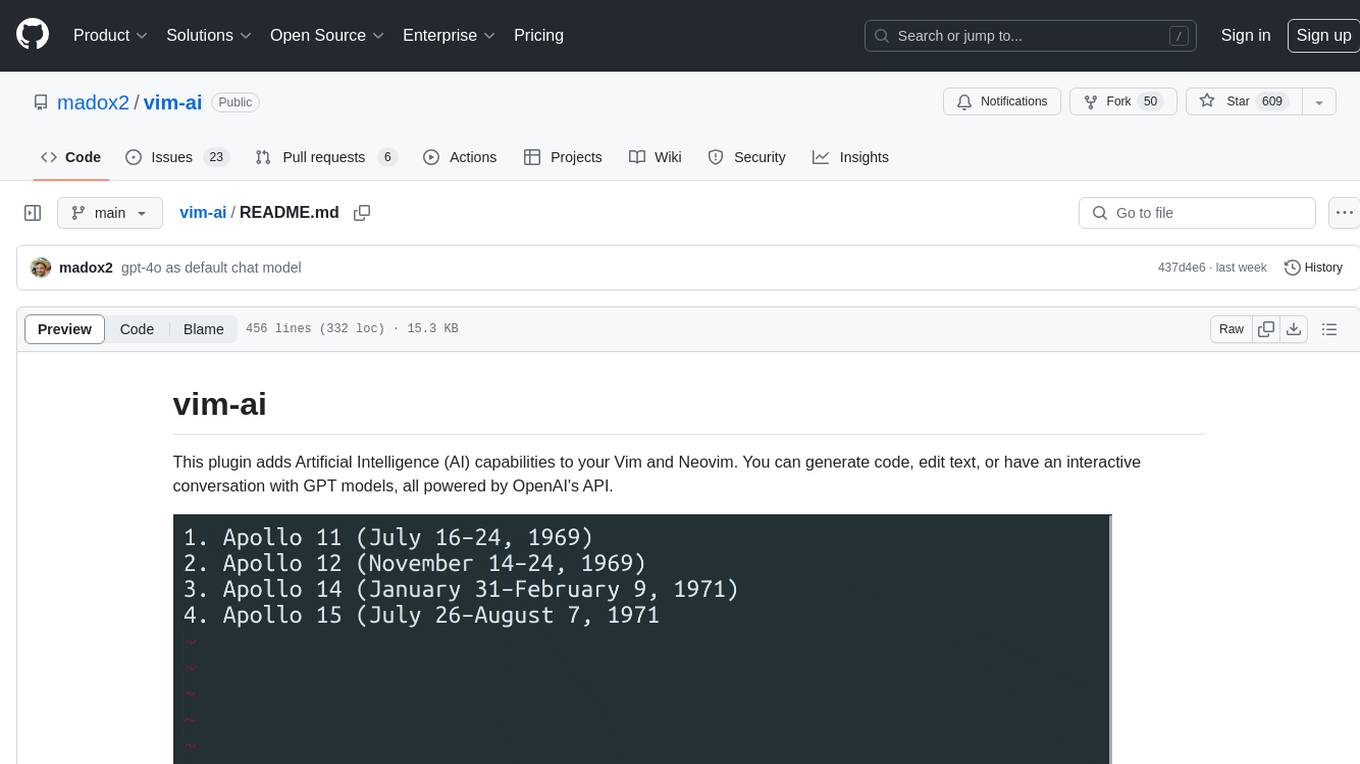
vim-ai
vim-ai is a plugin that adds Artificial Intelligence (AI) capabilities to Vim and Neovim. It allows users to generate code, edit text, and have interactive conversations with GPT models powered by OpenAI's API. The plugin uses OpenAI's API to generate responses, requiring users to set up an account and obtain an API key. It supports various commands for text generation, editing, and chat interactions, providing a seamless integration of AI features into the Vim text editor environment.
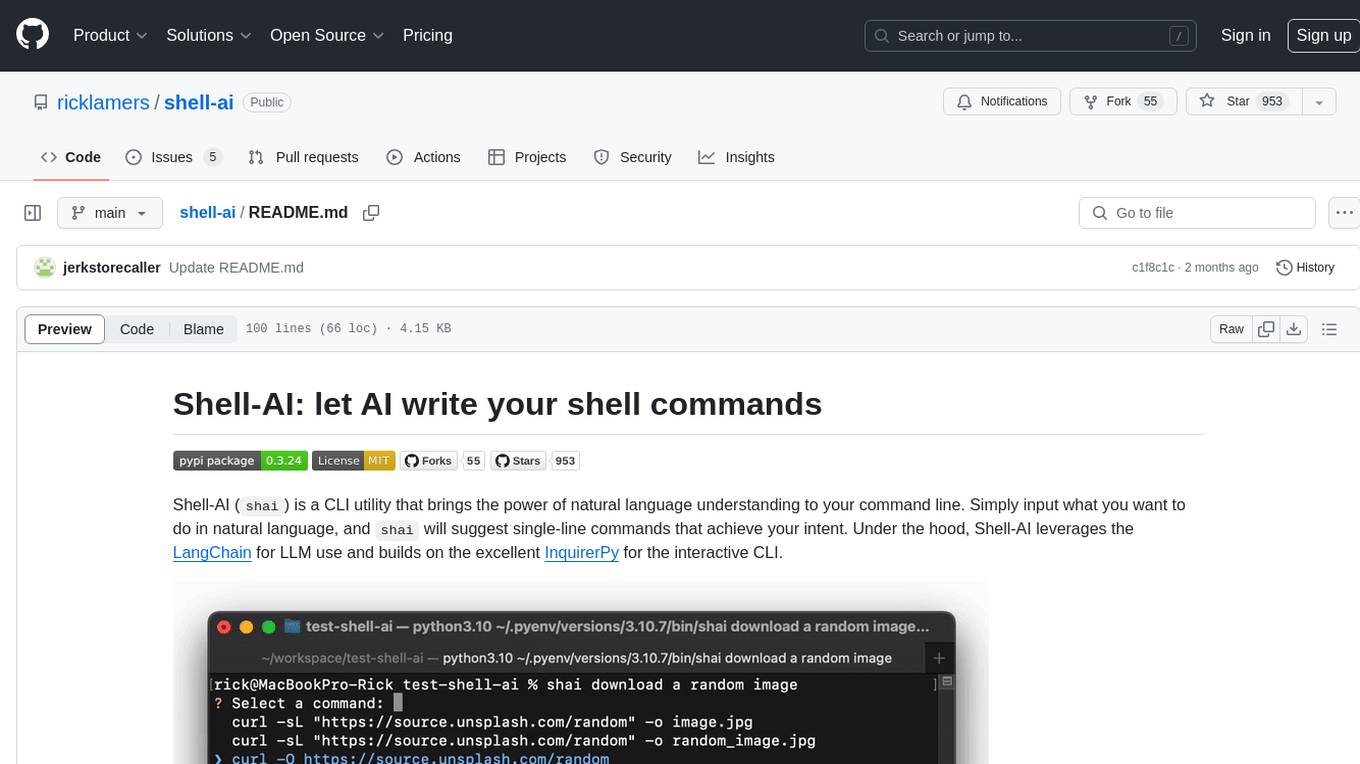
shell-ai
Shell-AI (`shai`) is a CLI utility that enables users to input commands in natural language and receive single-line command suggestions. It leverages natural language understanding and interactive CLI tools to enhance command line interactions. Users can describe tasks in plain English and receive corresponding command suggestions, making it easier to execute commands efficiently. Shell-AI supports cross-platform usage and is compatible with Azure OpenAI deployments, offering a user-friendly and efficient way to interact with the command line.
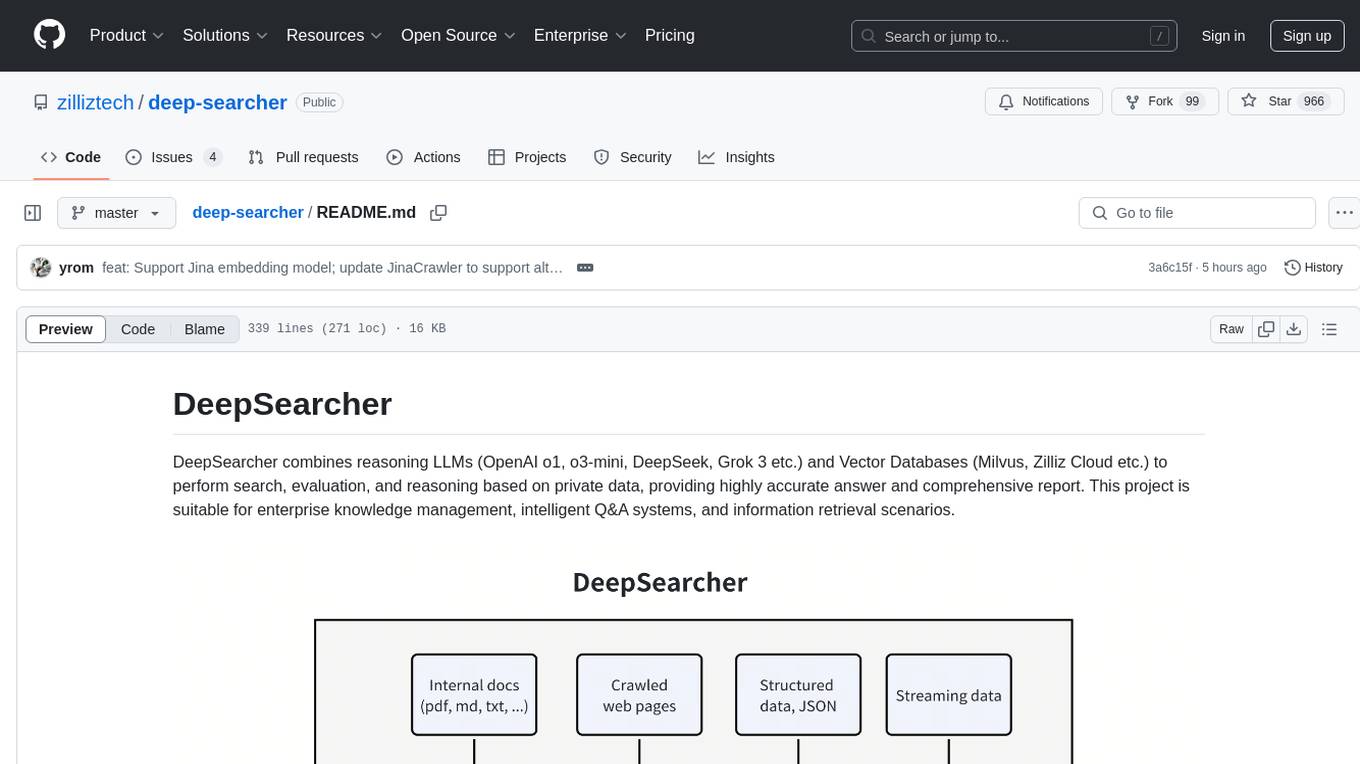
deep-searcher
DeepSearcher is a tool that combines reasoning LLMs and Vector Databases to perform search, evaluation, and reasoning based on private data. It is suitable for enterprise knowledge management, intelligent Q&A systems, and information retrieval scenarios. The tool maximizes the utilization of enterprise internal data while ensuring data security, supports multiple embedding models, and provides support for multiple LLMs for intelligent Q&A and content generation. It also includes features like private data search, vector database management, and document loading with web crawling capabilities under development.
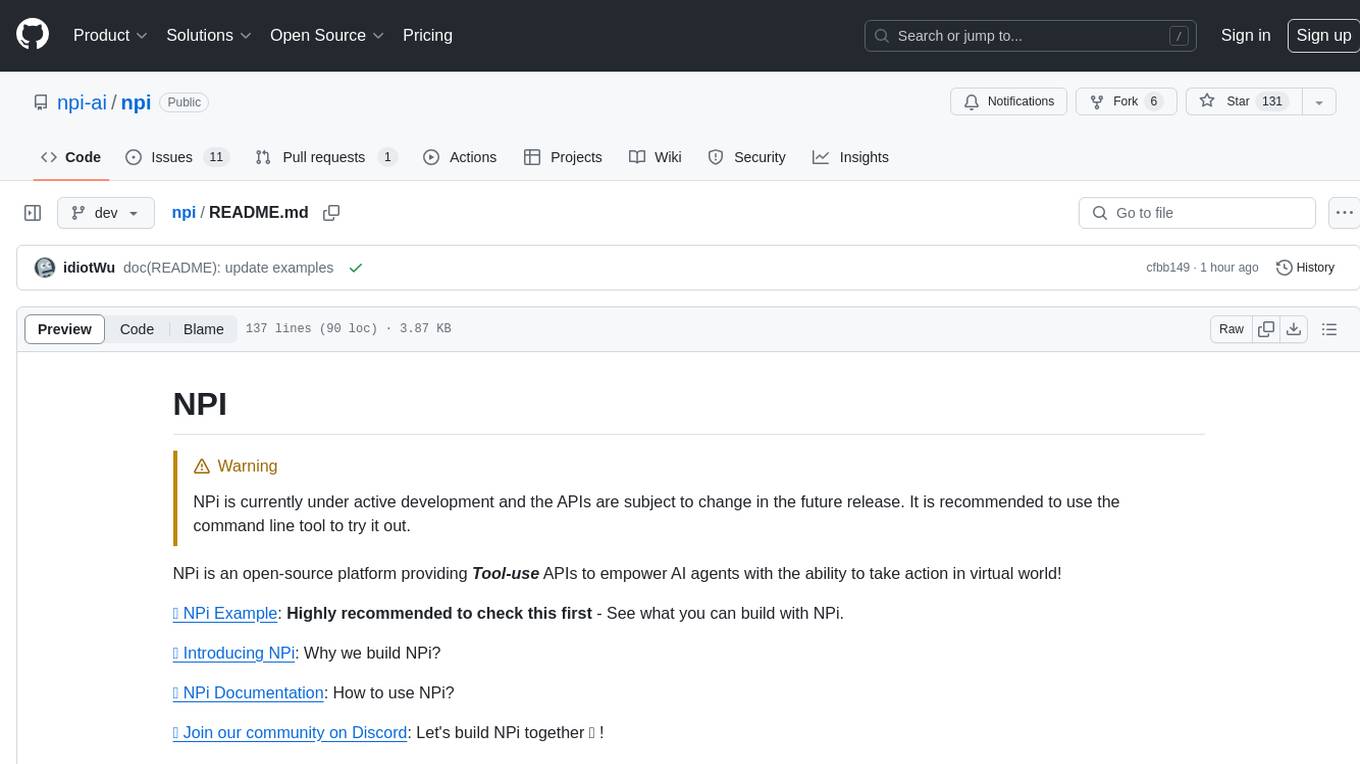
npi
NPi is an open-source platform providing Tool-use APIs to empower AI agents with the ability to take action in the virtual world. It is currently under active development, and the APIs are subject to change in future releases. NPi offers a command line tool for installation and setup, along with a GitHub app for easy access to repositories. The platform also includes a Python SDK and examples like Calendar Negotiator and Twitter Crawler. Join the NPi community on Discord to contribute to the development and explore the roadmap for future enhancements.
aiavatarkit
AIAvatarKit is a tool for building AI-based conversational avatars quickly. It supports various platforms like VRChat and cluster, along with real-world devices. The tool is extensible, allowing unlimited capabilities based on user needs. It requires VOICEVOX API, Google or Azure Speech Services API keys, and Python 3.10. Users can start conversations out of the box and enjoy seamless interactions with the avatars.
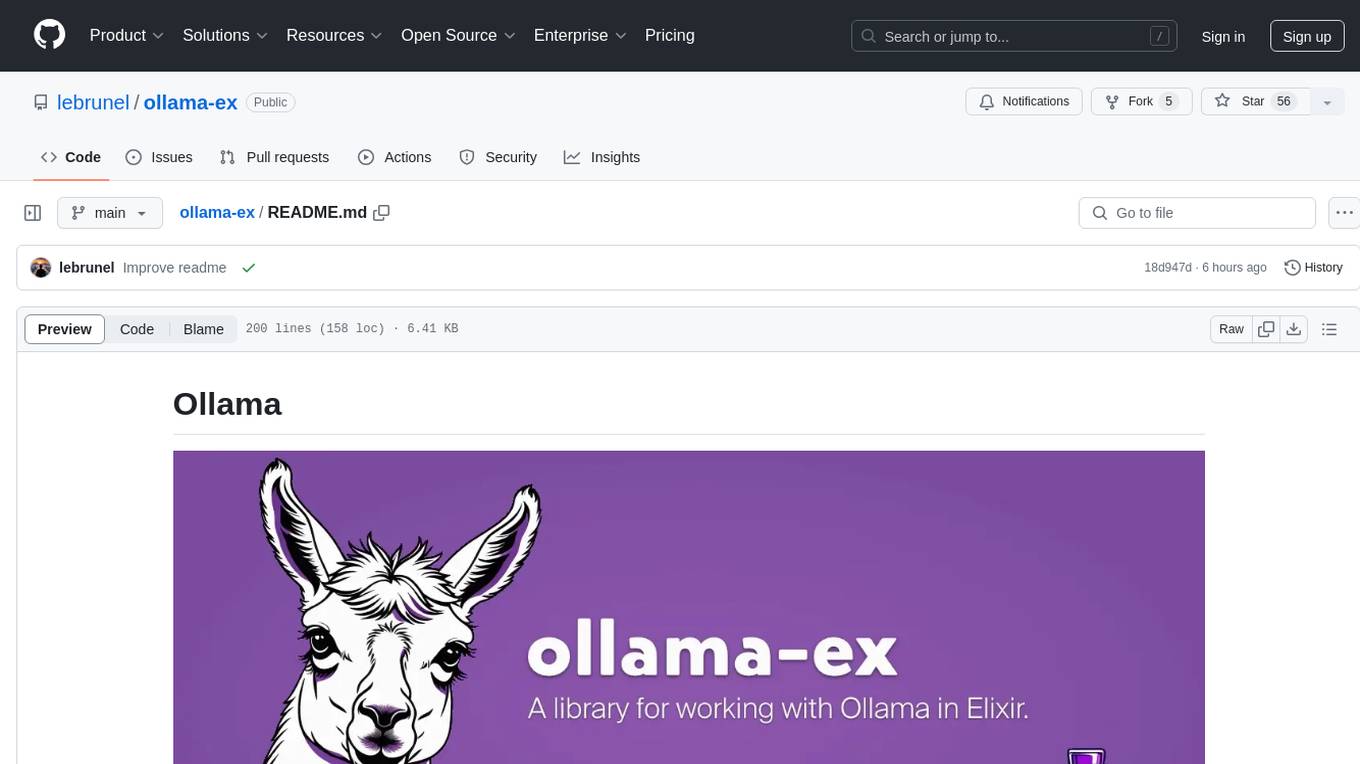
ollama-ex
Ollama is a powerful tool for running large language models locally or on your own infrastructure. It provides a full implementation of the Ollama API, support for streaming requests, and tool use capability. Users can interact with Ollama in Elixir to generate completions, chat messages, and perform streaming requests. The tool also supports function calling on compatible models, allowing users to define tools with clear descriptions and arguments. Ollama is designed to facilitate natural language processing tasks and enhance user interactions with language models.
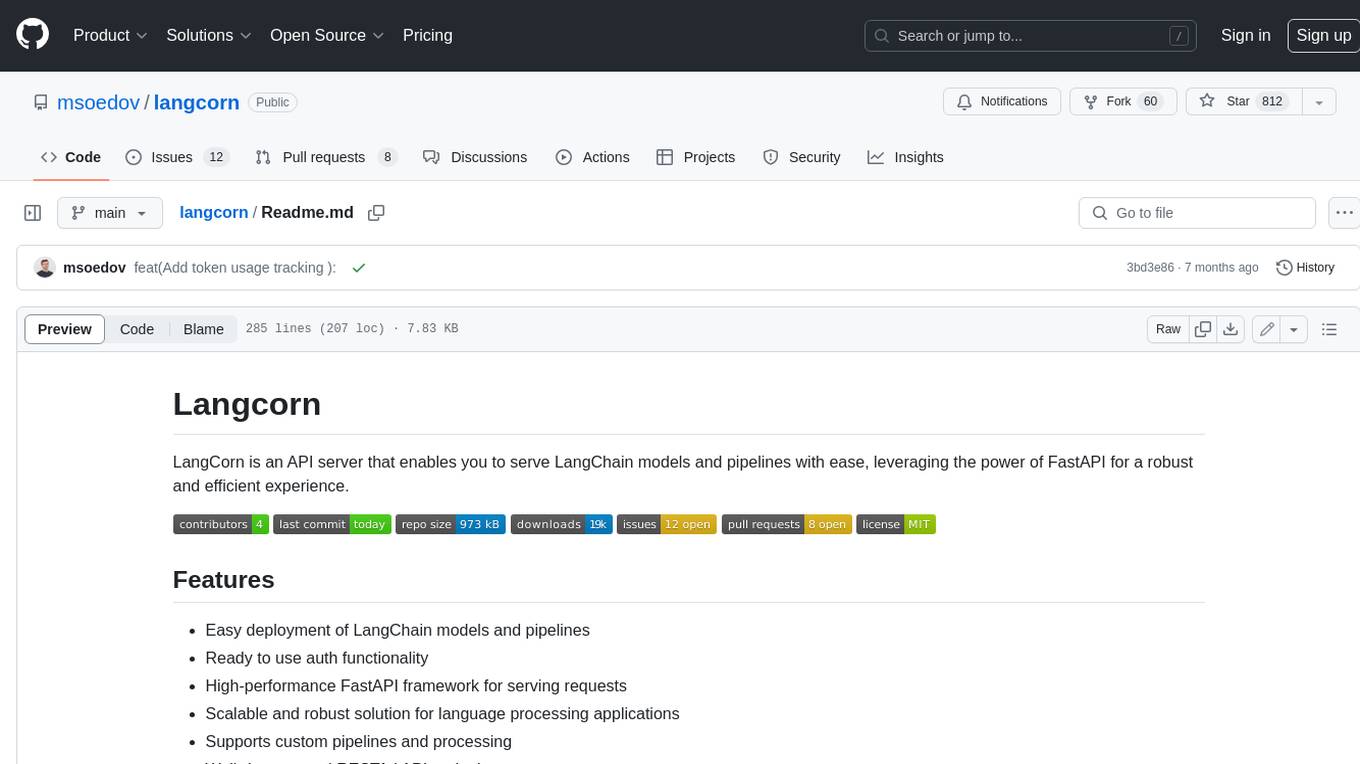
langcorn
LangCorn is an API server that enables you to serve LangChain models and pipelines with ease, leveraging the power of FastAPI for a robust and efficient experience. It offers features such as easy deployment of LangChain models and pipelines, ready-to-use authentication functionality, high-performance FastAPI framework for serving requests, scalability and robustness for language processing applications, support for custom pipelines and processing, well-documented RESTful API endpoints, and asynchronous processing for faster response times.
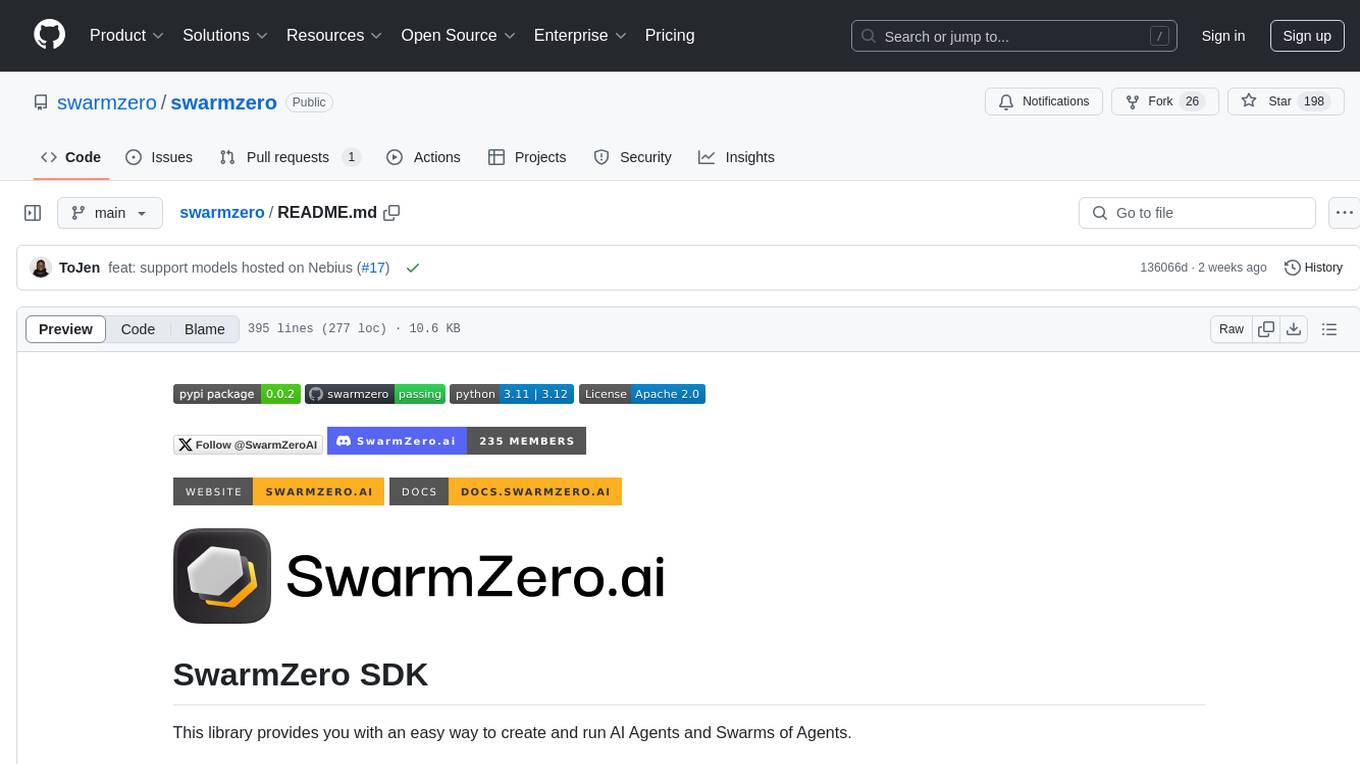
swarmzero
SwarmZero SDK is a library that simplifies the creation and execution of AI Agents and Swarms of Agents. It supports various LLM Providers such as OpenAI, Azure OpenAI, Anthropic, MistralAI, Gemini, Nebius, and Ollama. Users can easily install the library using pip or poetry, set up the environment and configuration, create and run Agents, collaborate with Swarms, add tools for complex tasks, and utilize retriever tools for semantic information retrieval. Sample prompts are provided to help users explore the capabilities of the agents and swarms. The SDK also includes detailed examples and documentation for reference.
For similar tasks

Azure-Analytics-and-AI-Engagement
The Azure-Analytics-and-AI-Engagement repository provides packaged Industry Scenario DREAM Demos with ARM templates (Containing a demo web application, Power BI reports, Synapse resources, AML Notebooks etc.) that can be deployed in a customer’s subscription using the CAPE tool within a matter of few hours. Partners can also deploy DREAM Demos in their own subscriptions using DPoC.

sorrentum
Sorrentum is an open-source project that aims to combine open-source development, startups, and brilliant students to build machine learning, AI, and Web3 / DeFi protocols geared towards finance and economics. The project provides opportunities for internships, research assistantships, and development grants, as well as the chance to work on cutting-edge problems, learn about startups, write academic papers, and get internships and full-time positions at companies working on Sorrentum applications.

tidb
TiDB is an open-source distributed SQL database that supports Hybrid Transactional and Analytical Processing (HTAP) workloads. It is MySQL compatible and features horizontal scalability, strong consistency, and high availability.

zep-python
Zep is an open-source platform for building and deploying large language model (LLM) applications. It provides a suite of tools and services that make it easy to integrate LLMs into your applications, including chat history memory, embedding, vector search, and data enrichment. Zep is designed to be scalable, reliable, and easy to use, making it a great choice for developers who want to build LLM-powered applications quickly and easily.

telemetry-airflow
This repository codifies the Airflow cluster that is deployed at workflow.telemetry.mozilla.org (behind SSO) and commonly referred to as "WTMO" or simply "Airflow". Some links relevant to users and developers of WTMO: * The `dags` directory in this repository contains some custom DAG definitions * Many of the DAGs registered with WTMO don't live in this repository, but are instead generated from ETL task definitions in bigquery-etl * The Data SRE team maintains a WTMO Developer Guide (behind SSO)

mojo
Mojo is a new programming language that bridges the gap between research and production by combining Python syntax and ecosystem with systems programming and metaprogramming features. Mojo is still young, but it is designed to become a superset of Python over time.

pandas-ai
PandasAI is a Python library that makes it easy to ask questions to your data in natural language. It helps you to explore, clean, and analyze your data using generative AI.

databend
Databend is an open-source cloud data warehouse that serves as a cost-effective alternative to Snowflake. With its focus on fast query execution and data ingestion, it's designed for complex analysis of the world's largest datasets.
For similar jobs

sweep
Sweep is an AI junior developer that turns bugs and feature requests into code changes. It automatically handles developer experience improvements like adding type hints and improving test coverage.

teams-ai
The Teams AI Library is a software development kit (SDK) that helps developers create bots that can interact with Teams and Microsoft 365 applications. It is built on top of the Bot Framework SDK and simplifies the process of developing bots that interact with Teams' artificial intelligence capabilities. The SDK is available for JavaScript/TypeScript, .NET, and Python.

ai-guide
This guide is dedicated to Large Language Models (LLMs) that you can run on your home computer. It assumes your PC is a lower-end, non-gaming setup.

classifai
Supercharge WordPress Content Workflows and Engagement with Artificial Intelligence. Tap into leading cloud-based services like OpenAI, Microsoft Azure AI, Google Gemini and IBM Watson to augment your WordPress-powered websites. Publish content faster while improving SEO performance and increasing audience engagement. ClassifAI integrates Artificial Intelligence and Machine Learning technologies to lighten your workload and eliminate tedious tasks, giving you more time to create original content that matters.

chatbot-ui
Chatbot UI is an open-source AI chat app that allows users to create and deploy their own AI chatbots. It is easy to use and can be customized to fit any need. Chatbot UI is perfect for businesses, developers, and anyone who wants to create a chatbot.

BricksLLM
BricksLLM is a cloud native AI gateway written in Go. Currently, it provides native support for OpenAI, Anthropic, Azure OpenAI and vLLM. BricksLLM aims to provide enterprise level infrastructure that can power any LLM production use cases. Here are some use cases for BricksLLM: * Set LLM usage limits for users on different pricing tiers * Track LLM usage on a per user and per organization basis * Block or redact requests containing PIIs * Improve LLM reliability with failovers, retries and caching * Distribute API keys with rate limits and cost limits for internal development/production use cases * Distribute API keys with rate limits and cost limits for students

uAgents
uAgents is a Python library developed by Fetch.ai that allows for the creation of autonomous AI agents. These agents can perform various tasks on a schedule or take action on various events. uAgents are easy to create and manage, and they are connected to a fast-growing network of other uAgents. They are also secure, with cryptographically secured messages and wallets.

griptape
Griptape is a modular Python framework for building AI-powered applications that securely connect to your enterprise data and APIs. It offers developers the ability to maintain control and flexibility at every step. Griptape's core components include Structures (Agents, Pipelines, and Workflows), Tasks, Tools, Memory (Conversation Memory, Task Memory, and Meta Memory), Drivers (Prompt and Embedding Drivers, Vector Store Drivers, Image Generation Drivers, Image Query Drivers, SQL Drivers, Web Scraper Drivers, and Conversation Memory Drivers), Engines (Query Engines, Extraction Engines, Summary Engines, Image Generation Engines, and Image Query Engines), and additional components (Rulesets, Loaders, Artifacts, Chunkers, and Tokenizers). Griptape enables developers to create AI-powered applications with ease and efficiency.





